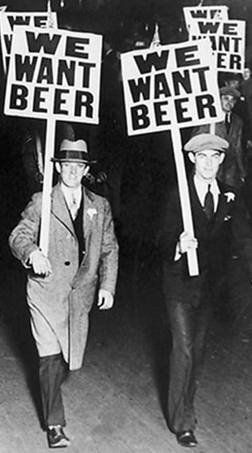A dark time in American history officially ended on December 5, 1933 — a day that we now call Repeal Day. Over a decade of national Prohibition ended on this day with the ratification of the 21st Amendment. Most articles on the period describe the inability of Prohibition to fix America’s out of control drinking problem, and in turn created a far greater problem of organized crime, which built and ran a black market alcohol trade with bribery, intimidation and violence.
It has been more than 80 years since the repeal of what is considered by some to be the only amendment in the Constitution to restrict rights rather than expand them. In “Last Call,” an article in the Washington Monthly, Tim Heffernan suggests that while Prohibition did not succeed the way its supporters hoped, the end may have set this country up for a better future. Could the so-called “noble experiment” and consequential end of Prohibition have been a good thing?
(READ: Breakthroughs in the Science Behind Malt Flavor)
Heffernan’s article compares the crime and health problems of the United Kingdom to those of the U.S. Heffernan suggests that while alcohol abuse and subsequent crime and health issues have steadily increased in the UK, America in comparison has not struggled with the same issues as deeply, despite the country’s tenuous relationship with adult beverages.
“The United States, although no stranger to alcohol abuse problems, is in comparatively better shape. A third of the country does not drink, and teenage drinking is at a historic low. The rate of alcohol use among seniors in high school has fallen 25 percentage points since 1980.”
Prohibition Changed the Way America Did Business
Heffernan believes that the two nation’s different paths stem from many things, but the laws and restrictions placed on how alcohol was sold in the U.S. at the end of Prohibition is a big factor.
“From civics class, you may remember that the 21st Amendment to the Constitution formally ended Prohibition in 1933. But while the amendment made it once again legal to sell and produce alcohol, it also contained a measure designed to ensure that America would never again have the horrible drinking problem it had before, which led to the passage of Prohibition in the first place.”
The Three-Tier System
 The 21st Amendment specifically worked to restrict vertical integration of the alcohol industry by creating a somewhat awkward partnership between the stakeholders. Today, we call this the three-tier system.
The 21st Amendment specifically worked to restrict vertical integration of the alcohol industry by creating a somewhat awkward partnership between the stakeholders. Today, we call this the three-tier system.
The system is set up to ensure that producers (brewers, distillers, importers, winemakers) must go through a middleman (broker or wholesaler) in order to get their product to market (retailers) for consumers to purchase.
The three-tier system exists with a certain level of discomfort, so that no single tier controls everything. For the most part, the system is intentionally archaic but has worked to ensure that history would not be repeated.
“…pre-Prohibition America, in which big, politically powerful liquor producers owned their own saloons and were, therefore, free to pour cheap booze into communities coast to coast, sweetening the doses with enticements ranging from rebates on drinks to cash loans, and frequently tolerating in-bar gambling and prostitution,” Heffernan writes.
(READ: Understanding the Three-Tier System: Its Impacts on U.S. Craft Beer and You)
Having never experienced Prohibition, the UK was not as successful in restricting vertical integration, resulting in, “…[m]onopolistic enterprises control[ing] the flow of drink in England at every step—starting with the breweries and distilleries where it’s produced and down the channels through which it reaches consumers in pubs and supermarkets,” according to the article.
The story goes on to warn that global beer concerns are attempting to work outside the three-tier system by finding ways to control the middle tier of the process. Read the albeit long, but interesting article and toast the end of Prohibition today on December, 5.
“Last Call” | Washington Monthly | November/December 2012
CraftBeer.com is fully dedicated to small and independent U.S. breweries. We are published by the Brewers Association, the not-for-profit trade group dedicated to promoting and protecting America’s small and independent craft brewers. Stories and opinions shared on CraftBeer.com do not imply endorsement by or positions taken by the Brewers Association or its members.


Share Post